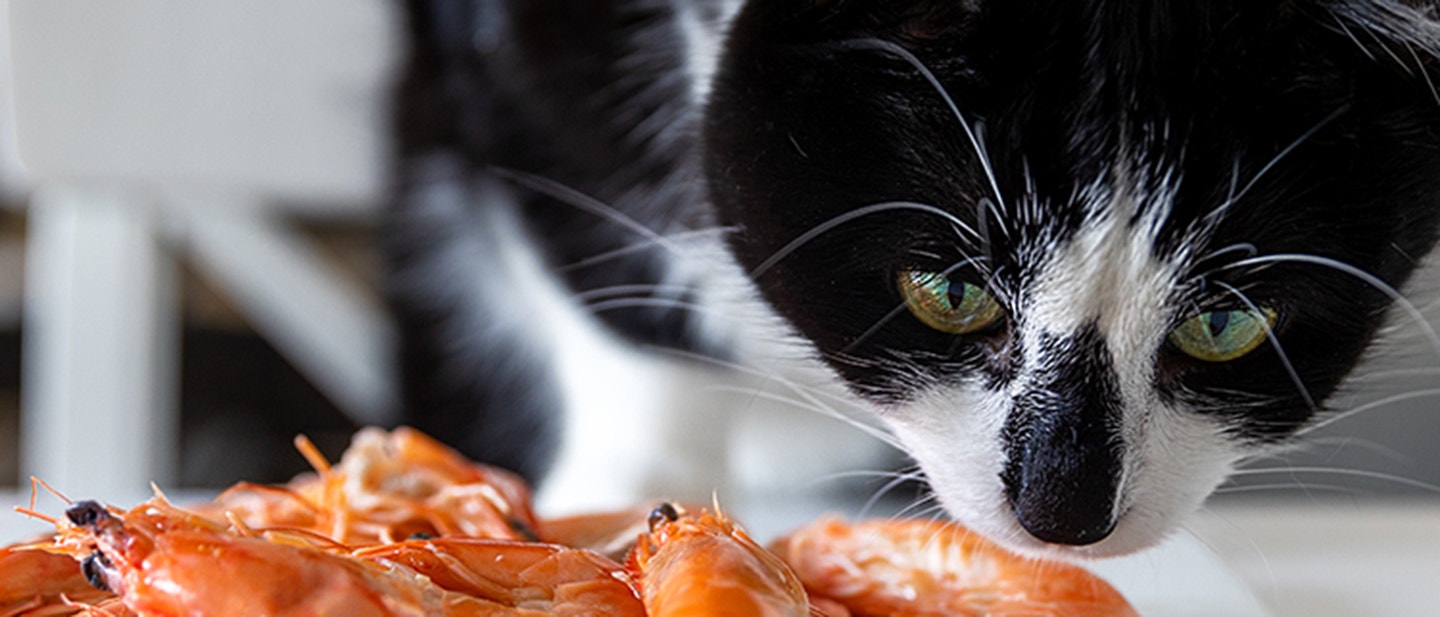
CAN CATS EAT PRAWNS?

Article checked by a vet
Cooked prawns are recommended for cats as raw prawns may carry harmful bacteria, especially if they have not been stored or preserved properly. Some cats may also be allergic to prawns, so it is best to introduce them slowly and in small quantities so you can monitor how well your cat tolerates them before making them a frequent treat. You should always look out for any changes to behaviour or digestive habits when introducing new foods to your cat’s diet as this will help you screen for food sensitivities.
Cats are also attracted to the salty aroma of prawns and shrimp, accompanied by their strong flavour. You may have noticed that cats often show less interest in cold food and are drawn to hot foods, this is because the smell is not as strong with cold food! Ultimately cats recognise that prawns are a great supplement to their diet and consider them a high-value food.
Prawns work best as a supplement to your cat's diet as an occasional treat and there are many advantages to mixed feeding adult cats. Some of the nutritional benefits of prawns are detailed below.
- Protein: Like fish, prawns are high in protein, a primary energy source which supports many bodily functions in cats. Unlike dogs, cats cannot survive without eating Taurine which is an amino acid found in meat, fish and eggs, so cats are considered obligate carnivores. Prawns provide lean protein, which means they are lower in fat content and calories yet still provide adequate nourishment for your pet.
- Vitamins: Prawns are jam-packed full of important vitamins including B vitamins which support cell growth, energy and metabolism.
- Minerals: Prawns also contain many important minerals including zinc which helps to maintain a healthy immune system. They also contain magnesium which supports many areas including bones, teeth, heart and muscle function as well as selenium which supports skin and can boost the immune system.
- Omega-3 fatty acids: Omega-3 fatty acids play an important role in your cat’s diet, they support skin and coat health, the immune system and joints. Fatty acids are also key for growing kittens. Fatty acids may also slow the progression of kidney disease in cats.
The symptoms of food poisoning in cats can be very unpleasant and include digestive problems, vomiting, diarrhoea, lethargy, loss of appetite, abdominal pain and dehydration so only feed cooked prawns to your cat.
It is important to note that some cats also love to play with their food. This increases the risk of contamination from raw prawns around your home as your cat may move the bacteria around different surfaces, so for that reason too, always offer cooked prawns, not raw.
Can cats eat king prawns?
Yes they can, but king prawns will require some extra preparation. There are also additional precautions you can take when preparing any kind of cooked prawns for your cat. Make sure to follow the steps below. Trying new foods with your cat can be very rewarding when they are introduced and prepared correctly!
Remove shells
Be sure to remove all of the shell from the prawn before feeding it to your cat. This is especially relevant for king prawns and langoustines as their shells can be thicker. Sharp pieces of shell can get stuck in your cat's throat and become a choking hazard.
Remove heads and tails
Next, remove the head and tail of the prawn as they can also become choking hazards when eaten. Again, this is especially relevant for king prawns and langoustines known for their larger size.
Make sure they are not seasoned
Prawns will often come marinated with additional seasonings or ingredients such as chilli, salt or garlic, these ingredients can be toxic for cats so it is important that you check the labels!
Making sure that the prawns are in date
Prawns that have not been stored correctly or have reached their best before date have a higher chance of carrying bacteria like salmonella which can make you and your cat very ill, so we advise that you always check your prawns are in date and cook them before feeding them to your cat.
Can cats eat prawn crackers and other prawn flavoured foods
Many people wonder if cats can eat prawn crackers, and the answer is no! We do not recommend feeding your pet prawn crackers or any other ‘prawn’ flavoured foods such as crisps. Prawn flavoured foods are not appropriate for consumption by cats and could make them ill. Prawn flavoured foods like prawn crackers are high in salt, fat and also contain many additives and preservatives that are unhealthy and can cause digestive issues for cats.
What are the alternatives to prawns
Fresh cooked fish, cooked eggs and cooked meat are also good alternatives to prawns if your cat is not keen on them or has a sensitivity. Just like prawns, these items should not be the main food source of protein in your cat's diet, they should only be used as a treat once in a while.
Prawns can also be expensive and labour-intensive to feed to cats which makes them a luxury. Find the best fish alternatives summarised below! It's important to note that when you feed your pet a complete and balanced cat food tailored to the life-stage and life-style it ensures they will be receiving all of the nutrients they need in just the right amounts. Any protein rich tasty treats like this should only be offered occasionally, not every day.
- Tuna
- Salmon
- Trout
- Cod
- Whitefish
- Herring
- Sardines
- Haddock
Does it matter what breed of cat I have?
Yes! The breed of cat you have will have an impact on their food preferences. Different breeds prefer different foods and a cat’s appetite may also change as they grow older. Cats may also become intolerant to certain foods over time or warm up to them. While it is always key to watch out for signs that new foods do not agree with them, such as digestive issues, however, new foods can also keep your cat stimulated and happy, so it is worth the effort.
Can you give your cat prawns
In conclusion, can cats eat prawns? Yes! However, it is always best to feed your pet cooked prawns not raw prawns, to avoid them consuming any nasty bacteria which could make them sick. Prawns are also best reserved as a special treat alongside a complete and well balanced diet of high quality cat food. Always make sure to de-shell and remove the head and the tail of cooked prawns before feeding them to your cat as they may be choking hazards. Prawns often come with additional ingredients added such as chilli or garlic, avoid these types at all costs by always checking the labels.
Can cats have raw seafood?
Cats can eat raw seafood and prawns but it is not advised. Raw seafood and fish have a much higher likelihood of containing harmful bacteria which are the most common cause of food poisoning. The symptoms of food poisoning in cats can be very unpleasant and include vomiting, diarrhoea, lethargy, loss of appetite, abdominal pain and dehydration. To avoid food poisoning only feed cooked seafood to your cat.
Is it OK to give cats raw shrimp?
Cats can eat raw prawns but it is not advised as raw seafood and fish have a much higher likelihood of containing harmful bacteria which are the most common cause of food poisoning. The symptoms of food poisoning in cats can be very unpleasant and include vomiting, diarrhoea, lethargy, loss of appetite, abdominal pain and dehydration. Only feed cooked seafood to your cat.
